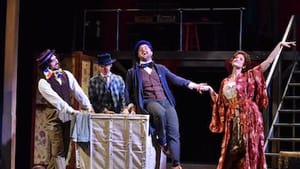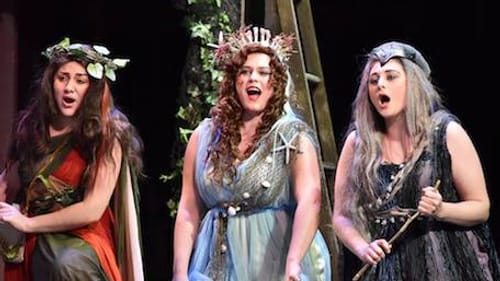Stay in the Loop
BSR publishes on a weekly schedule, with an email newsletter every Wednesday and Thursday morning. There’s no paywall, and subscribing is always free.
Send in the Clowns
Academy of Vocal Arts presents Richard Strauss and Hugo von Hofmannsthal's 'Ariadne auf Naxos'

The intimate, salonlike Helen Corning Warden Theater at the Academy of Vocal Arts (AVA) proves an ideal venue for Richard Strauss’s Ariadne auf Naxos. Strauss and his librettist, Hugo von Hofmannsthal, set their 1912 comic masterpiece in the home of the richest man in Vienna, who has commissioned an evening of entertainment to impress his distinguished guests. AVA’s ornately furnished digs on Rittenhouse Square act as a stand-in for a stately mansion in the Innere Stadt.
Dorothy Danner’s smart and savvy staging offers riches beyond its well-placed location. Finding the right balance of humor and pathos in this opera can be challenging. Its first act (called the “Prologue”) depicts preparations for the bespoke performance, with a high-minded opera company and a salty troupe of commedia dell’arte clowns fighting for supremacy backstage. When their patron announces that, due to time constraints, they must perform their disparate works simultaneously, the opera launches into musical and theatrical overdrive.
The second act shows the fruits of this unlikely amalgamation, with Ariadne’s lonely existence incongruously interrupted by plucky Zerbinetta and her posse of tricksters. Strauss’s score juxtaposes elements of late Romanticism in Ariadne’s two narrative arias, “Ein Schönes war” and “Es gibt ein Reich,” with the coloratura fireworks of Zerbinetta’s “Großmächtige Prinzessin,” a long and witty comic narrative about the fickle nature of love. The opera-within-an-opera culminates in an ardent love duet for Ariadne and the demigod Bacchus, who rescues her from solitude.
We're all merely players
Danner smartly foregrounds artifice in her interpretation; the audience never loses sight of the fact that we’re watching a performance. Peter Harrison’s set design resembles a makeshift playing space, with wooden stairs and raised platforms; the drawing of a muslin scrim signifies scene changes.
Val Starr’s costumes have a similarly improvised quality — in particular, Bacchus’s flowing toga and crown of laurels look more Animal House than Euripides. The singers compellingly shade their characters in the opera proper, but always remain actors playing roles.

Vocally, the production shows the strengths of AVA’s current crop of resident artists. Claire de Monteil sings Ariadne with powerful resonance and appealing morbidezza, although her German diction seems a tad too inflected by her native French. John Matthew Myers brings an impressive amount of lyricism to the short but punishing role of Bacchus. In the Prologue, both act with appropriate hauteur as the opera company’s tempestuous prima donna and star tenor.
Alexandra Nowakowski possesses a meatier sound than one normally hears from Zerbinetta — a welcome change in a role than can easily turn squally. She shows no trouble reaching the aria’s stratospheric (and sustained) Es and Fs, finishing the showpiece with stamina to burn. She receives able support from Daniel Gallegos, Oliver Sewell, Matthew White, and Brent Michael Smith; the quintet leans into the bawdy comedy of the piece without overplaying it.
The production, however, belongs to two characters who sing only in the Prologue. Hannah Ludwig dazzles as the Composer, her richly colored mezzo easily dispatching the role’s high-lying tessitura. (Though written for soprano, the role has largely been ceded to heavier voices in recent years). Ludwig communicates the young, headstrong musician’s passion for his composition, which he initially refuses to change to meet his patron’s demands.
Timothy Renner brings levity and the wisdom of age — not to mention a sturdy, evenly produced baritone — to the Music Master. Even when Renner and Ludwig reappear silently in the second act, they command attention. These are artists ready to take their places on the international stage.
David Aronson leads AVA’s orchestra in a shimmering reading of the intricate score. He achieves the full power of Strauss’s richly textured orchestrations without ever overwhelming the singers. The thrilling combination of an intelligent production, exciting singers, and a world-class orchestra affirm the Composer’s exhortation that Musik ist eine heilige Kunst — music is the most sacred art.
What, When, Where
Ariadne auf Naxos. By Richard Strauss and Hugo von Hofmannsthal, Dorothy Danner directed. Academy of Vocal Arts. Through March 3, 2018, at the Helen Corning Warden Theater, 1920 Spruce Street, Philadelphia. (215) 735-1685 or avaopera.org.
Sign up for our newsletter
All of the week's new articles, all in one place. Sign up for the free weekly BSR newsletters, and don't miss a conversation.

 Cameron Kelsall
Cameron Kelsall